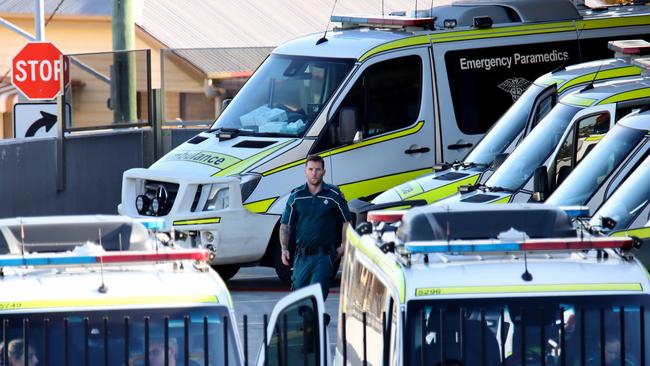78-year-old man reportedly dies during hours long wait at Gold Coast hospital emergency
A 78-year-old man’s death after being treated for nearly two hours in an “overcrowded” Gold Coast hospital corridor due to a bed shortage has prompted a review call. Read the latest updates
News
Don't miss out on the headlines from News. Followed categories will be added to My News.
A 78-year-old man suffering a diabetic episode has died after spending almost two hours in an “overcrowded” Gold Coast hospital corridor before getting a bed.
Gold Coast University Hospital’s Emergency Department head Dr David Green said at the time of the May 14 incident it was one of the “busiest days” he’d seen in nearly 40 years. Dr Green added at the time the ED was at 155 per cent capacity.
The patient was rushed via ambulance to Gold Coast University Hospital about 4.43pm on Tuesday May 14, according to internal emails leaked to 9News.
Paramedics escalated concerns to the hospital traige and team leader and the “ramped paramedic crews completed forms which indicated the patient’s deterioration”, the leaked emails say.
By about 6.30pm, the man was taken to a bed in the emergency department resuscitation area but he suffered a heart attack minutes after he was moved and was placed on life support but later died, it is reported.
CHAOS AS 30 AMBULANCES RAMPED AT COAST HOSPITAL

It has prompted Queensland Ambulance Service medical director Dr Stephen Rashford to voice serious concerns about the incident, writing to health bosses: “This case requires local escalation asap so the hospital can review their performance.and an investigation is being conducted by hospital staff.”
Dr Green, speaking at a press conference on the episode on Tuesday morning, said the elderly man was triaged and transferred immediately from the ambulance to the hospital.
However he said a critical bed shortage meant the man was left waiting an hour and 45 minutes in a department corridor before being transferred to a bed.
“The fundamental problem was a lack of beds to offload that patient on to,” he said.
“Ideally, we would want to offload that patient into a bed soon as he arrived.
“We were unable to do that due to the circumstances.”
HEALTH MINISTER SHANNON FENTIMAN ACCUSED OF WITHHOLDING AMBULANCE DATA

Dr Green said patients that arrive in the ED but are unable to be offloaded onto a bed are cared for in a joint effort by hospital and Queensland Ambulance Service staff.
At the time of arrival, the ED had 157 other patients, operating at 155 per cent capacity.
“I’ve been here nearly 40 years and it was one of the busiest days that I have ever seen,” he added.
“ED overcrowding is a major problem throughout Australia and the world.
“But rest assured the patient was receiving care throughout the time of that clinical episode.”
Dr Green said the man spent a total of 11 hours at the hospital receiving care before he died.
Dr Rashford in correspondence with other health bosses had written the man “should never have remained ramped”.
Dr Green said he had spoken to Dr Rashford Monday evening.
“The ambulance is under huge pressure to respond to calls in the community,” he said.
“When all their cars are left on hospital ramps then they can’t respond,” Dr Green said.
“However we’ve done a lot of work in that space to free up those ambulances. Probably more so than any other hospital in South East Queensland.”
Dr Green said the GCUH bed shortage was placing “enormous pressure” on ED staff, more so than ambulance ramping.
“It’s very distressing for staff at the moment.
“But I want to assure while I’m the clinical director, no patient will ever be left in the back of an ambulance,” Dr Green said.




